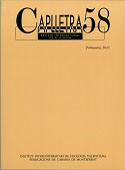Models of literary and audio-visual translation in colloquial Catalan: the case of Quentin Tarantino’s «Jackie Brown»
DOI:
https://doi.org/10.7203/caplletra.58.7178Keywords:
literary translation, audio-visual translation, dubbing, subtitling, colloquial Catalan, colloquial translation models, Quentin Tarantino, Jackie Brown Abstract
Abstract
Abstract: This article deals with the models of colloquial translation into Catalan in the case of the dubbed version (1997), the subtitled version (1997) and the translated script (1998) of Quentin Tarantino’s Jackie Brown (1997). At the core of the article lies the analysis and the comparison of the phonetics, the morphology, the syntax and the lexicon of each Catalan translation, which is contextualized within the linguistic and translation models current at the time. The conclusion is that the three translations make use of different colloquial language models. The translated script constitutes a disruptive model, especially regarding phonetic representation and the Spanish lexicon deployed. The dubbed version follows TV3’s translation and dubbing criteria: on the one hand, its syntax is relatively colloquial (less colloquial than that of the subtitled version, but not so much as the translated script); on the other hand, its morphology is standard and under-exploits the colloquial resources of the target language. The subtitled version is more colloquial than the dubbed one, especially as far as the lexicon is concerned, using far fewer Hispanicisms than the translated script.
Key words: literary translation, audio-visual translation, dubbing, subtitling, colloquial Catalan, colloquial translation models, Quentin Tarantino, Jackie Brown.
 Downloads
Downloads
Downloads
Published
How to Cite
-
Abstract725
-
PDF (Català)439
Issue
Section
License
Authors submitting work to Caplletra for publication must be the legitimate holder of the usage rights. Legitimacy for the purposes of publishing the work must also include images, tables, diagrams and any other materials that may complement the text, whether they are the author of such material or not.
Copyright: on publishing their work in the journal, the author grants Caplletra. Revista Internacional de Filologia usage rights (reproduction, distribution and public communication) for both the paper printed version and for the electronic version.
All work published in Caplletra is covered by the Creative Commons license type Attribution-NonCommercial-NoDerivatives 4.0 (CC BY-NC-ND 4.0).
RESPONSABILITY
Caplletra. Revista Internacional de Filologia does not necessarily identify with the points of view expressed in the papers it publishes.
Caplletra. Revista Internacional de Filologia accepts no responsibility whatsoever for any eventual infringement of intellectual property rights on the part of authors.






